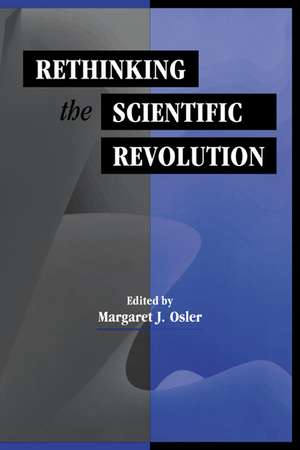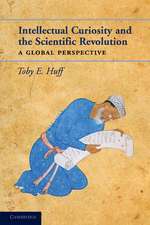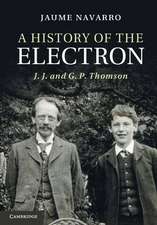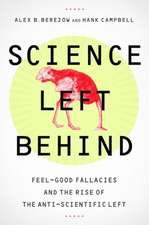Rethinking the Scientific Revolution
Editat de Margaret J. Osleren Limba Engleză Paperback – 12 mar 2000
| Toate formatele și edițiile | Preț | Express |
|---|---|---|
| Paperback (1) | 400.66 lei 6-8 săpt. | |
| Cambridge University Press – 12 mar 2000 | 400.66 lei 6-8 săpt. | |
| Hardback (1) | 757.85 lei 6-8 săpt. | |
| Cambridge University Press – 12 mar 2000 | 757.85 lei 6-8 săpt. |
Preț: 400.66 lei
Nou
Puncte Express: 601
Preț estimativ în valută:
76.67€ • 81.98$ • 63.92£
76.67€ • 81.98$ • 63.92£
Carte tipărită la comandă
Livrare economică 18 aprilie-02 mai
Preluare comenzi: 021 569.72.76
Specificații
ISBN-13: 9780521667906
ISBN-10: 0521667909
Pagini: 356
Ilustrații: 5 b/w illus.
Dimensiuni: 153 x 230 x 21 mm
Greutate: 0.6 kg
Ediția:New.
Editura: Cambridge University Press
Colecția Cambridge University Press
Locul publicării:New York, United States
ISBN-10: 0521667909
Pagini: 356
Ilustrații: 5 b/w illus.
Dimensiuni: 153 x 230 x 21 mm
Greutate: 0.6 kg
Ediția:New.
Editura: Cambridge University Press
Colecția Cambridge University Press
Locul publicării:New York, United States
Cuprins
Introduction: the canonical imperative: rethinking the scientific revolution Margaret J. Osler; Part I. The Canon in Question: 1. Newton as final cause and first mover Betty Jo Teeter Dobbs; 2. The scientific revolution reasserted; Part II. Canonical Disciplines Reformed: 3. The role of religion in the Lutheran response to Copernicus Peter Barker; 4. Catholic natural philosophy: alchemy and the revivication of Sir Kenelm Digby Bruce Janacek; 5. Vital spirits: redemption, artisanship, and the new philosophy of Early Modern Europe Pamela Smith; 6. 'The terriblest eclipse that hath been seen in our days': Black Monday and the debate on astrology during the Interregnum William E. Burns; 7. Arguing about nothing: Henry More and Robert Boyle on the theological implications of the void Jane E. Jenkins; Part III. Canonical Figures Reconsidered: 8. Pursuing knowledge: Robert Boyle and Isaac Newton Lawrence M. Principe; 9. The alchemies of Robert Boyle and Isaac Newton: alternative approaches and divergent deployments; 10. The Janus faces of science in the seventeenth century: Athanasius Kircher and Isaac Newton; 11. The nature of Newton's 'holy alliance' between science and religion: from the scientific revolution to Newton (and back again); 12. Newton and Spinoza and the Bible scholarship of the day Richard H. Popkin; 13. The fate of the date: the theology of Newton's Principia revisited; Part IV. The Canon Reconstructed: 14. The truth of Newton's science and the truth of science's history: heroic science at its eighteenth-century formulation.
Recenzii
"This is now the place to look for guidance on whether (and how) we may still speak of a scientific revolution in 17th-century Europe....especially illuminating on contrasts between Boyle and Newton in their alchemy, theology and epistemology. A fitting tribute to Betty Jo Dobbs and Richard S. Westfall, whose competing views set an attractive agenda." John Brooke, Oxford University
"The Scientific Revolution still divides historians into those who see it as an undeniably real period of historical change comparable with the Renaissance and the Reformation, and those who see it merely as a term of convenience for historians of science. In this important new collection each of the authors reassesses the Scientific Revolution, some in the widest possible terms, others by focussing upon one episode or one individual, with a view to redressing this problem. The result should be required reading for all those interested in the formation of the modern world. Margaret Osler has done well to bring together such an impressive group of contributors, from the most promising to the most distinguished." John Henry, University of Edinburgh
"...this is a rich and stimulating collection that shoulf compel any historian to abandon retailing the traditional notion of the 'Scientific Revolution.'" American Historical Review
"...the reader can find here much new information and many interpretations about the roles in the birth of modern science played by lesser known individuals...and by disciplines and topics usually seen now, but not then, as extra-scientific." The Review of Metaphysics
"The Scientific Revolution still divides historians into those who see it as an undeniably real period of historical change comparable with the Renaissance and the Reformation, and those who see it merely as a term of convenience for historians of science. In this important new collection each of the authors reassesses the Scientific Revolution, some in the widest possible terms, others by focussing upon one episode or one individual, with a view to redressing this problem. The result should be required reading for all those interested in the formation of the modern world. Margaret Osler has done well to bring together such an impressive group of contributors, from the most promising to the most distinguished." John Henry, University of Edinburgh
"...this is a rich and stimulating collection that shoulf compel any historian to abandon retailing the traditional notion of the 'Scientific Revolution.'" American Historical Review
"...the reader can find here much new information and many interpretations about the roles in the birth of modern science played by lesser known individuals...and by disciplines and topics usually seen now, but not then, as extra-scientific." The Review of Metaphysics
Descriere
This collection reconsiders canonical figures and the formation of disciplinary boundaries during the Scientific Revolution.















